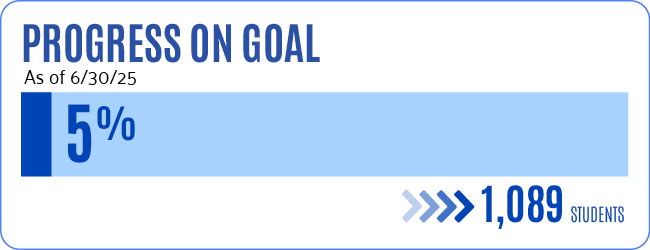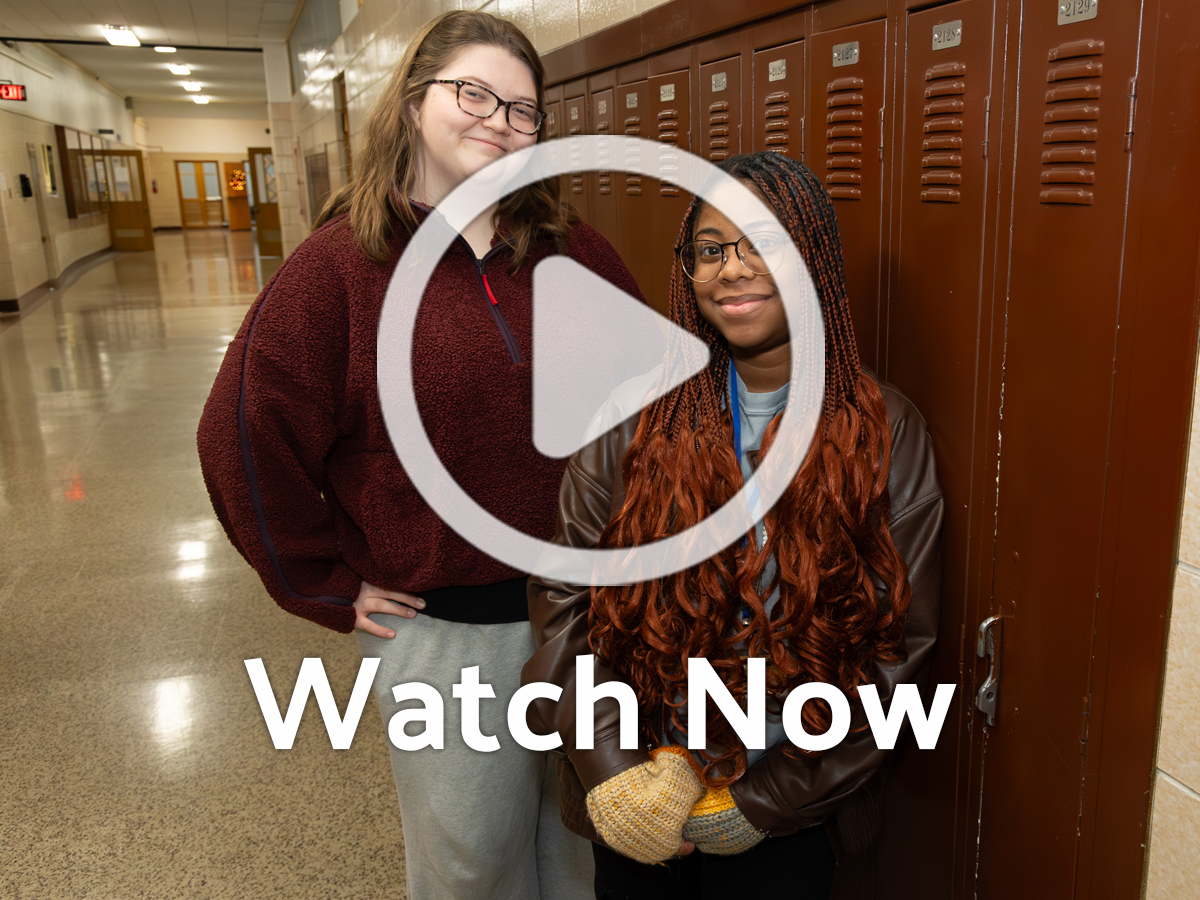
Teen mental wellness: Empowering Minds
Adolescence is a pivotal time for young people. When we can help kids here, we help launch successful futures.
Teen Mental Wellness: Empowering Minds
Our goal: Empowering Minds schools will elevate the mental wellness of 21,000 high school students by 2030.
Why It’s Important
It’s not easy being an adolescent or a young adult. Not only are they experiencing physical, hormonal, and emotional changes that can be uncomfortable and confusing, but they’re also dealing with societal expectations and challenges.
According to the World Health Organization, half of all mental health conditions start by age 14. Most cases go undetected and untreated until many years later or sometimes not at all.
Adolescence is a pivotal time for young people. When we can help kids here, we help launch successful futures.
When we, as a community, focus on Teen Mental Wellness, we are:
- Creating systems level change. Comprehensive school mental health systems will have positive effects at school, in the community, and at home.
- Supporting our children so they feel less sad and hopeless.
- Reducing mental health disparities among students.
- Improving student learning, attendance, engagement, and graduation rates.
- Reducing bullying, risky behaviors, substance abuse, school violence, and involvement in the juvenile justice system.
New and increased gifts to Teen Mental Wellness: Empowering Minds are doubled by Badger Meter from 7/1/25 to 6/30/26 up to $100,000.
What We’re Doing Together
We can change the lives of high school students by focusing on prevention, equity, and access to mental health services.
How it Works
- Achieving targeted milestones is the centerpiece of this initiative; this is how we will measure success.
- The six milestones are based on Wisconsin’s Department of Public Instruction’s School Mental Health Framework.
![]()
Needs Assessment: mapping the current state and sharing all existing resources with students and parents.
![]()
Collaboration: building bridges with students, parents, community providers and the school to regularly engage on mental health.
![]()
Referral Pathways: knowing when and how to triage students who need support into the right level of help.
![]()
Comprehensive Resources: promoting and supporting overall mental wellness and early interventions, as well as having the ability to get care for students who need a higher level of support.
![]()
Sustainability: identifying strategies that optimize financial and nonfinancial assets needed to maintain and improve the Comprehensive School Mental Health System.
![]()
Evaluation: collecting both quantitative and qualitative data to inform priorities and action steps to continuously improve the Comprehensive School Mental Health System.
How will we know when a school has implemented a milestone?
A milestone is achieved when schools implement the necessary components that improve their specific Mental Health System. Both quantitative and qualitative data is collected to ensure each component and milestone functions as intended.
We are not re-inventing the wheel with this initiative. We’re helping to scale existing, proven research.
How We’re Changing Lives

One school (Waukesha South High School) met the required milestones needed to meet the definition of elevating the mental wellness of their students, so we can now count a total of 1,089 students toward our main goal. We are on pace to meet our goal by 2030.
Overall, 9,294 students were provided mental health support and services across all nine schools funded in 2024-2025.
In the 2025-26, the following schools are part of Teen Mental Wellness: Empowering Minds.
- Cristo Rey Jesuit High School Milwaukee
- Dr. Howard Fuller Collegiate Academy High School
- Grafton High School
- Marquette University High School
- Messmer High School
- Milwaukee Academy of Science High School
- Pewaukee High School
- Pius XI Catholic High School
- Ronald Reagan High School
- Shorewood High School
- St. Augustine Preparatory Academy
- Vel R. Philips Juvenile Justice Center School
- Waukesha South High School
- Waukesha West High School
- Wauwatosa East High School
- Wauwatosa West High School
Schools were selected based on student need, school readiness, success potential, and geographic distribution. We anticipate adding schools to the initiative over the next three school years.
Become a SUSTAINING Donor
Commit to making an annual gift of $5,000 or more to Teen Mental Wellness: Empowering Minds for 5 years.
The Facts
United Way prioritizes investing deeper into issue areas that meet the following criteria: an issue that truly impacts the community (indicated by data), an issue that our donors would be inspired to give to, and internal capacity and knowledge on the team to drive the work forward. The below facts are key to why this issue was selected.
 $100 billion is the economic cost of untreated mental illness for all ages each year in the U.S.
$100 billion is the economic cost of untreated mental illness for all ages each year in the U.S.- 44% is the percentage of American teenagers that felt persistent feelings of sadness or hopelessness in 2021. This is the highest level ever recorded.
- Nearly 1 in 2 students in Wisconsin reported anxiety in 2019. A majority of youth in Wisconsin are connected to schools.
- 75% of adults with behavioral/mental health conditions experienced symptoms by age 24
- As of 2021, at least one-third of Wisconsin emerging adults ages 18-24 experienced anxiety on most days.
- While there are strong local initiatives and coalitions focused on younger children, there is not the same current support for high-school students.
- White youth are more likely than their Black and Hispanic counterparts to receive treatment after experiencing an acute major depressive episode.
- Treatment for depression remains highest among White teens. Estimates of past year treatment for depression were similar among Black and Hispanic teens and lowest among Asian teens.
Additional Details
Why did we pick this topic?
- We looked at a wide range of mental health issues facing our community it became clear after our analysis and conversations with stakeholders that youth mental health was the most urgent need.
- We know that:
- Mental health issues were increasing among youth before the pandemic.
- Poor mental health diminishes quality of life.
- Poor mental health is a known root cause of poor educational attainment, poor financial stability, substance use disorders, and homelessness, among other things.
- The U.S. Surgeon General issued an advisory in 2021 to highlight the urgent need to address the youth mental health crisis.
- Community stakeholders agree there are gaps in the current system that United Way has the ability to impact.
What impact do we think we can have?
Our goals are to:
- Create and support Empowering Minds Schools of Distinction.
- Reduce stigma – which leads to early detection, more effective prevention, increased access and utilization of mental health services, and a reduction in feelings of shame and self-consciousness by students
- Increase access to mental health services.
- Increase mental health literacy among adults and students – Mental health literacy creates a shared language among adults and students. Students have asked for more adults to have this shared understanding so that they feel more comfortable approaching an adult with any mental health issues they may be experiencing.
- Create healthier school and home environments – parents with lived experience that served as advisors strongly believe that home environments will also improve with this work because schools, caregivers, and home life are inextricably linked – what a student learns in school doesn’t stay at school when they go home.
What do we hope is different on the other end of the (multi-year) work?
Our goals are:
- Create systems level change – comprehensive school mental health systems will have positive effects at school, in the community, and at home.
- Have less students experiencing persistent feelings of sadness and hopelessness.
- Reduce mental health disparities among students.
- Improve student learning, attendance, engagement, graduation rates.
- Reduce bullying, risky behaviors, substance abuse, school violence, involvement in juvenile justice system.
Empowering Minds Advisory Committee
Tim Baack
Heather Birk
Audrey Burghardt
Dr. Haji Camara
Laura Cherone
Dr. Clarence Chou
Kimberlee Coronado
Frank Cumberbatch
Leanne Delsart
Gabriela Dieguez
Martina Gollin Graves
Kristen Harris
Amy Herbst
Kia Holloway
Leah Jepson
Daysi Jimenez
Dr. Lakeia Jones
Tracey Loken Weber
Mary Madden
Kimberly Merath
Kim Polki
Benjamin Porter
Chris Przedpelski
Scott Schuler
Dr. Sebastian Ssempijja
LaShawndra Vernon
Melissa Will
Luke Waldo
Special Thanks to our Teen Mental Wellness: Empowering Minds Sponsor
Questions: Contact Amanda Weiler, MPH at 414.263.8116 or via email.


